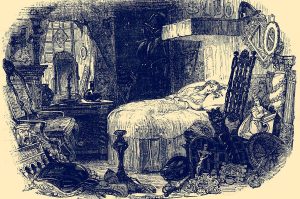What is “woke”? To Jordan B. Peterson it is “postmodern neo-Marxism.” To James Lindsay it is “critical race theory” and latterly “revisionism” in general. These theories of what woke means take for granted that one of its core tenets is a denial of objective truth under the influence of what is broadly called “critical theory,” but the thinking behind contemporary wokeness falls far short of these theoretically exalted standards.
Critical theory was a movement, primarily among academics, in the mid 20th century which had a diverse array of followers, but the common denominator was the belief that texts, whether literary works like novels, or historical documents, had no inherently “true” interpretation. What this means, to hugely simplify, is that there exist as many ways to read a story as there are readers. The critical theorists arrived at this idea by different arguments, one of the most famous is Roland Barthes’ reading of Sarrasine, a short story by the 19th century French writer Honore de Balzac, by breaking down each sentence into a system of “signs” largely borrowed from psychoanalysis.
It is pretty obvious, if you are an activist interested in spreading your ideology to as many different media as possible, that an idea which lets you disregard the intention of the original author would be appealing. When critical theory crossed the Atlantic (and hopped across the Channel), it rapidly lost its brooding, Nouveau Roman character and found its utility in readings which emphasized the implicit racial, sexual and gendered meanings of texts. This was not always the case: one of the foremost critical theorists, Paul de Man, was a collaborationist writer in Nazi-occupied Belgium. De Man conceived of his own brand of critical theory as a means of pre-empting, and expurgating, any intrusion of “the social” into literature by claiming that any such reading was arbitrary.
However, today, the left has entirely abandoned even the pretense of postmodern skepticism present in retro-eighties critical theory. The phrase of the day is “media literacy,” a meme implying that there is an objectively “correct” way to read texts, or watch movies, and a set of compulsory moral judgments about art to be derived from it. Go on Google Trends and you’ll see searches for “media literacy” jump in the 2022-23 mid-Biden era, when woke influencers like Hasan Piker and @woke_karen on TikTok began using the term. Search the tweets of a typical woke kingpin like evan loves worf or Will Stancil on X and you will see “media literacy” breathlessly invoked as if it were the God of a newly imported cult. The term is ubiquitous in the subreddits associated with these communities.
Media literacy does not, like the critical theorists, try to read texts through complex philosophical lenses like Marxism, let alone deconstruct them. It exists at the intersection of the vast online world we call “fandom” – in which very basic storytelling techniques, tropes and characterization are explained in less rigorous terms for the sake of entertainment – and the lowest levels of woke academia (“Why The Matrix is about Late Capitalism”). If critical theory proclaimed the death of the author, media literacy is the deification of fandom. What other people say about the work is all that matters to understanding it.
The left has entirely abandoned even the pretense of postmodern skepticism
What does this look like in practice? A frequent subject of the media literacy polemic is the film Starship Troopers, beloved of many online right-wingers because it shows a militarised, quasi-fascist society battling hostile aliens. An Adorno, a Derrida or a Foucault would, albeit badly, try to analyze what this says about fascists. The contemporary woke leftist can only point to the dismal intention of the creators for this to be a “satire”. This is what the term means 90 percent of the time it is used: a generic right-winger, somewhere, likes a piece of art but rejects the moral assumptions of the fandom or the creator. Thus, the right-winger is somehow “illiterate” because… because… they just are. Much like, I suppose, anyone who reads The Tempest, and finds the portrayal of the colonized subject Caliban more sympathetic than Prospero, “doesn’t understand” Shakespeare.
An uncontroversial standard of “good” art is that it should stand on its own terms and be judged on qualities inherent in the work – in common parlance “show, don’t tell.” The judgment of fandom websites and creators is an example of telling and not showing. The fact that a creator wills something to be a satire does not make it satirical. Satire, for example, requires at least some people to find it funny; the 2008 comic strip PowerUp Comics is intended to be a “satire” of George W. Bush but does not work because it is so obvious. Contrary to the creators’ intention, the comic today is enjoyed ironically as an example of on-the-nose moralizing.
Similarly, simply declaring that you find your creations immoral does not mean people with different moral views are “misunderstanding” the work. When right-wingers decide that they support the supposedly parodic protagonists of Starship Troopers, Watchmen and Warhammer 40k they are not failing to understand something about the show. Rather, they are rejecting socially mediated signifiers to liberate the pure text. They are, in short, ideal postmodern readers.
Modern wokes remind me of the career of an earlier French literary critic, Sainte-Beuve. Sainte-Beuve thought that he was woke. He was steeped in Eclecticism, a minor philosophical movement which took inspiration from Hegel. But Sainte-Beuve got it wrong. He thought that what this meant was that writers could only be understood by their biographies, which inevitably included a great deal of moral commentary on the value of the lives in question. He rapidly became a catchphrase of ignominy among 19th century cognoscenti. Nietzsche called him an “ass” and Marcel Proust devoted an essay to making fun of him, because his oeuvre rapidly degenerated into a series of tabloid kiss-and-tell stories about whether such-and-such writer was a good husband.
So, too, have many educated in the tradition of critical theory ended up recapitulating a basically Victorian literalism in how they see art: art is good if it is produced by good people, if it carries sentimental value and if it edifies society. Criticism is good if it comprehends the moral intention of a morally virtuous creator. This is not just bad news for the arts (left-wing people are and will remain dominant in culture for at least another generation) but bad news for the left. As we see Trump’s Department of Homeland Security making repatriation the subject of jokes, it is not that the right “doesn’t understand” some facet of left-wing morality – they actively reject it. If the left wants to put up a persuasive counterargument, it must be prepared to face moral differences head on, rather than outsource their critical faculties to consensus.


























Leave a Reply